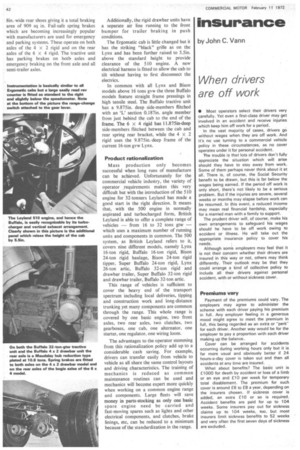insurance
Page 44

If you've noticed an error in this article please click here to report it so we can fix it.
by John C. Vann
When drivers are off work
• Most operators select their drivers very carefully. Yet even a first-class driver may get involved in an accident and receive injuries which keep him off work for a period.
In the vast majority of cases, drivers go without wages when. they are off work. And it's no use turning to a commercial vehicle policy in these circumstances, as no cover operates under it for personal accident.
The trouble is that lots of drivers don't fully appreciate the situation which will arise should they have to stay away from work. Some of them perhaps never think about it at all. There is, of course, the Social Security benefit to be drawn, but this is far below the wages being earned. If the period off work is only short, there's not likely to be a serious problem. But if the injuries are severe, several weeks or months may elapse before work can be resumed. In this event, a reduced income may mean real financial hardship, especially for a married man with a family to support. "
The prudent driver will, of course, make his own arrangements to safeguard his wages should he have to be off work owing to accident or illness. He will take out the appropriate insurance policy to cover his needs.
Although some employers may feel that it is not their concern whether their drivers are insured in this way or not, others may think differently. Their outlook may be that they could arrange a kind of collective policy to include all their drivers against personal accident, with or without sickness cover.
Premiums vary
Payment of the premiums could vary. The employers may agree to administer the scheme with each driver paying his premium in full. Any employer feeling in a generous mood might agree to meet the premium in full, this being regarded as an extra or "perk" for each driver. Another way would be for the employer to pay a proportion with each driver making up the balance.
Cover can be arranged for accidents occurring during working hours only but it is far more usual and obviously better if 24 hours-a-day cover is taken out and then all accidents at any time are insured.
What about benefits? The basic unit is £1000 for death by accident or loss of a limb or an eye and £10 per week for temporary total disablement. The premium for such cover is around £6 to £8 a year, depending on the insurers chosen. If sickness cover is added, an extra £10 or so is required. Accident benefits are paid for up to 104 weeks. Some insurers pay out for sickness claims up to 104 weeks, too, but most insurers limit 'sickness benefits to 52 weeks and very often the first seven days of sickness are excluded.








































































































